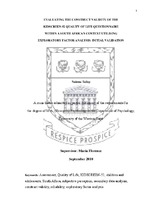Evaluating the Construct Validity of the KIDSCREEN-52 Quality of Life questionnaire within a South African context utilizing Exploratory Factor Analysis: Initial validation
Abstract
The absence of a suitable measure to assess the health related quality of life (HRQoL) of children and adolescents in South Africa, led to the use of the KIDSCREEN-52 questionnaire in this study. This questionnaire was developed and standardised in Europe and it assesses quality of life from the subjective perception of children and adolescents in terms of their physical, mental and social well-being. The use of assessment measures with different populations or in different milieu from the original standardisation context necessitates
establishing the validity of such measures for the new utilization context. Thus, the aim of this quantitative study is specifically directed at examining the construct validity of the KIDSCREEN-52 within a South African context. Accordingly, this study is located within the theoretical framework of construct validation theory. Data for this Secondary Data Analysis study was drawn from the “Impact of Hope and Exposure to Community Violence on children’s perception of Well-being” study. The primary study employed stratified interval
criterion sampling to select 565 grade 9 learners, aged 14-18 from six public schools. The dataset for the current study comprised all participants (N=565) of the broader study. As the initial step in validation of the KIDSCREEN-52 within South Africa, the current study examined the factor structure of the KIDSCREEN-52 within this context by means of exploratory factor analysis using principal component analysis with oblimin rotations. It also assessed the internal consistency reliability of each of the scales using Cronbach’s alpha.
Exploratory factor analysis revealed the same 10 factors as identified by previous European studies with some deviation in the last two factors, which warrants further examination. Internal consistency of the measure was shown to be acceptable, with Cronbach’s alpha values ranging from 0.76 to 0.81 for the 10 scales.

